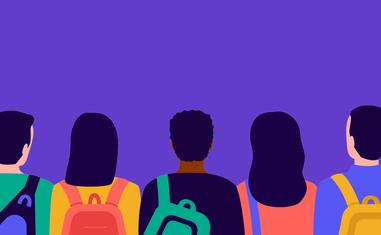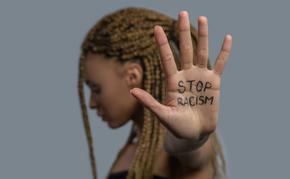The views expressed in our content reflect individual perspectives and do not represent the authoritative views of the Baha'i Faith.
Each society has one critical job: identifying and overcoming the systemic barriers to equity so children and youth can reach their full potential. This task deserves the best our minds and hearts can give it.
If we fail to build equitable, fair, and just paths toward fulfilling futures for the young, our societies will inevitably falter.
So how might we better empower our youth to take charge of realizing their own potential? How can we join together to examine the barriers and challenges and strive to overcome them from a broader and more holistic perspective? Because of the vital relevance of helping our young people realize their potential, further reflection, study, and consultation on this topic can only benefit our common future. \
RELATED: Why It’s Important to Discuss Gender Inequality with Teens
The spirit, perseverance, and talent of the many dedicated souls currently serving communities around the world in so many different capacities must be awakened and nurtured in the hearts and minds of others, especially our youth, so they can play a productive and active role in transforming their lives and their environments. Awakening these energies that are latent in everyone and channeling them toward the betterment of society will bring about true, lasting, and positive change. Nothing short of transforming both our inner characters and our outer environments can bring about and sustain the change needed to make our world a better place for all.
The Baha’i teachings see this crucial work with young people as one of the keys to human progress. In a 2001 letter to the world’s Baha’is, the Universal House of Justice – the democratically-elected global leadership body of the Baha’i Faith – urged everyone to focus on:
… the development of local communities, communities that are characterized by tolerance and love and guided by a strong sense of purpose and a collective will. It is these communities that serve as the environment in which the capacities of all components – men, women, youth and children – are developed and their powers are multiplied in unified action.
That’s just one of the many reasons Baha’i communities all around the world sponsor free activities for all children and youth.
Baha’is know that good intentions, practical knowledge, and resources, though important, are not enough to bring about the changes needed in society. Unless we are guided and motivated by spiritual principles – such as honesty, trustworthiness, compassion, and justice – our efforts to solve the inordinate problems facing us will only achieve limited success. These character traits need to be cultivated early in life through a healthy upbringing and education, which in turn depends on nourishing and supporting our communities and institutions to develop these qualities essential for our well-being.
How, then, do we rid ourselves of the primary inequities in our society that form barriers to realizing the potential of our young people? Though we may have the knowledge and resources to overcome those barriers, we often lack the vision, commitment, and will. As these are endemic societal problems, we’re limited in our ability to change them – but if we do not try to understand them and eradicate them, whatever other partial solutions we apply to curing their symptoms will fail to bring about the healing our society needs. Let’s look at three of these important issues:
1. Economic Disparities
One of these inequities relates to economics. The extremes of wealth and poverty, where a handful of people have unimaginable wealth while millions are starving and in need is unconscionable, especially in a world that purports to be guided by the principles of justice and concern for our neighbors. Many of the problems with our children and youth and in our community can be traced to poverty. More attention needs to be given to solving this global problem and addressing this gross injustice.
2. Racial Injustice
Another barrier to equity is racial prejudice and discrimination. Racism is pervasive in the United States and many other nations and has been an accepted ideology and practice for centuries. This violation of human dignity and rights is an impediment for our young people, blighting progress in our community for both the victims and perpetrators. Baha’is believe there is only one human race. Baha’u’llah, the prophet and founder of the Baha’i Faith, said:
The fundamental purpose animating the Faith of God and His Religion is to safeguard the interests and promote the unity of the human race, and to foster the spirit of love and fellowship amongst men.
Those who have wrongly divided humankind based on superficial characteristics such as the color of one’s skin have used that falsehood to discriminate against those who they imagine as inferior to themselves. This obstinate evil and outrageous violation of human rights has brought untold harm to untold millions and must be overcome. The sooner we recognize we are scientifically and spiritually one people, and live according to that truth, the better we will all be.
RELATED: How to Harness the Vast Energy of Youth for Social Change
3. Gender Injustice
A third inequity involves women, one-half of the world’s population. Though some progress is being made in this area, women are still not accorded equal rights, respect, and opportunities in many parts of our world. This not only deprives women of realizing their full potential, but it also deprives the world of women’s rich and needed influence and contributions toward progress. As with each of these inequities, it harms both the oppressed and the oppressors. Not only does it engender in men harmful attitudes and behaviors that infect the greater society, it deprives all of us of the social, moral, and intellectual balance desperately needed in our time.
These three injustices, and the ignorance and prejudice that go with them, have done incalculable harm to our children and youth. By becoming more conscious of these and other social and cultural barriers that impede young people from realizing their spiritual and material potential, our ability to overcome them and other deep-seated and long-standing prejudices and injustices is strengthened. A full and frank discussion of these inequities and their solutions is needed at all levels of society. These injustices are based on the false and destructive beliefs that some people are inferior, and therefore, less deserving of equitable treatment. These beliefs have no spiritual, moral, biological, psychological, or scientific basis. Allowing all parties to consider dispassionately the solutions needed will take time and effort, but is necessary if we are to find agreement on what is best for all and to work together in unity.
Legislation is needed as well, but it is not enough to create the more equitable opportunities needed by our youth. We also need to change the individuals and institutions that allow such injustices to continue. As we put into practice those principles and values that will bring about positive and lasting results, such as truth, love, and justice, our communities and our institutions will see positive change that leads to further progress and growth. The long-term development of our communities largely depends on our investing in youth, families, and education and supporting those who assume responsibility for working for the betterment of all.
When we witness the resilience and commitment of individuals and groups to work for the betterment of all, we will be filled with hope, a much-needed commodity in these trying times. The obstacles, inequities, and injustices we see in our society should spur us on rather than deflate our hope and our effort to create a better world. The more we can openly, honestly, and compassionately confront these problems, striving as much as possible to avoid the conflict and strife that characterizes so much of our society, the more we can find solutions based on our shared reality – and make realistic plans to implement those solutions.
Let us join together to begin this process. Let us have deep and unifying conversations directed toward finding realistic solutions.

















Comments
Sign in or create an account
Continue with Facebookor